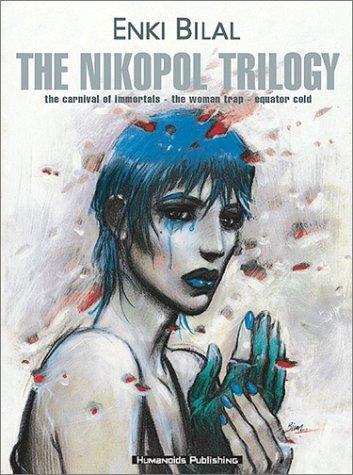emfiliane reviewed The Nikopol Trilogy by Enki Bilal
Review of 'The Nikopol Trilogy' on 'Goodreads'
3 stars
An interesting, rather bleak look at the human future from the peak of the cold war, and the immediate aftermath in the last chapter. Nuclear wars, a breakdown of Western states into fascist city-states ruled by dictators, and the steady expansion of Communism are all assumed. It's a world of the desperately poor, the oppressed elite, the cruel despot, the amoral gods, and the annoyingly whiny anti-hero; it's hard to root for anyone in the first chapter, though the second and third bring a few more interesting characters. The art is busy but colorful and exotic, vividly creating a world you can believe in and admire, although I wasn't a fan of the second chapter's art style -- Jill in particular looks like clay. Each chapter was made six years after the last, so vast differences in style and tone are to be expected. As stiff as the characters can …
An interesting, rather bleak look at the human future from the peak of the cold war, and the immediate aftermath in the last chapter. Nuclear wars, a breakdown of Western states into fascist city-states ruled by dictators, and the steady expansion of Communism are all assumed. It's a world of the desperately poor, the oppressed elite, the cruel despot, the amoral gods, and the annoyingly whiny anti-hero; it's hard to root for anyone in the first chapter, though the second and third bring a few more interesting characters. The art is busy but colorful and exotic, vividly creating a world you can believe in and admire, although I wasn't a fan of the second chapter's art style -- Jill in particular looks like clay. Each chapter was made six years after the last, so vast differences in style and tone are to be expected. As stiff as the characters can look, I give it a pass for being such an achievement.
Reading it, I'm never quite sure how seriously to take the plot; sometimes it drives forward on the strength of personal interaction, and other times it unravels and reforms on a self-mocking whim, a bit of a disjointed trip, very familiar to any fan of French cinema. Each chapter builds up greatly, then quickly wraps up and peters out with an unsatisfying conclusion; they're probably just too grand to flesh out properly. The second and third chapters, being more personal than the vast sweeping revenge arc of the first, are more successful. The Deus Ex Machina is strong in this one, but when one of the anti-heroes is a god, that's to be expected.
Some of the printed writing is a serious eyestrain to read, being so tiny and thin -- particularly in the third chapter, with its many wordy infodumps used as a shortcut to world-building.
Jill is a very interestingly created character, alternately full of turmoil and detachment, easily the one I was most interested in and wished had more time.
For all of its flaws, I liked the book, and I'd recommend it to any fan of dystopian futures. I found the movie to be a little more enjoyable; the art direction and scenery in particular works better on screen than the slightly too-busy and stiff art on the page.

